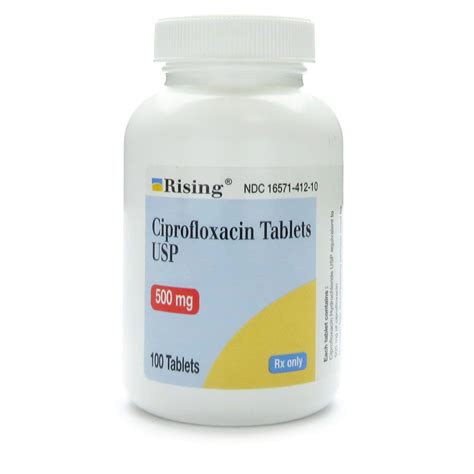Intro
Ciprofloxacin Hcl 500mg antibiotic tablet treats bacterial infections, including urinary tract infections, with broad-spectrum efficacy, fighting susceptible bacteria and promoting recovery.
Ciprofloxacin Hcl 500mg antibiotic tablets are a commonly prescribed medication for treating various bacterial infections. The importance of understanding this medication cannot be overstated, as it is crucial for patients to be aware of its uses, benefits, and potential side effects. In this article, we will delve into the world of Ciprofloxacin Hcl 500mg, exploring its mechanisms, applications, and essential information for patients and healthcare professionals alike.
The rise of antibiotic resistance has made it increasingly challenging to treat bacterial infections effectively. As a result, medications like Ciprofloxacin Hcl 500mg have become vital in the fight against these infections. By grasping the fundamentals of this antibiotic, individuals can better navigate the complexities of bacterial infections and make informed decisions about their treatment options. Whether you are a patient, a caregiver, or simply interested in learning more about antibiotics, this article aims to provide a comprehensive overview of Ciprofloxacin Hcl 500mg.
Ciprofloxacin Hcl 500mg is a fluoroquinolone antibiotic, which means it belongs to a class of medications that target bacterial DNA to prevent the growth and spread of infections. This antibiotic is effective against a broad spectrum of bacteria, including both Gram-positive and Gram-negative strains. Its versatility and potency have made it a popular choice among healthcare professionals for treating various infections, ranging from mild to severe cases.
Ciprofloxacin Hcl 500mg: Mechanism of Action

Ciprofloxacin Hcl 500mg works by inhibiting bacterial DNA gyrase and topoisomerase IV, enzymes essential for bacterial DNA replication and transcription. By blocking these enzymes, the antibiotic prevents bacteria from reproducing and eventually leads to their death. This mechanism of action is highly effective against a wide range of bacterial infections, including respiratory tract infections, skin and soft tissue infections, and urinary tract infections.
Pharmacokinetics and Pharmacodynamics
The pharmacokinetics of Ciprofloxacin Hcl 500mg involve its absorption, distribution, metabolism, and excretion. After oral administration, the antibiotic is rapidly absorbed into the bloodstream, with peak plasma concentrations reached within 1-2 hours. It is then distributed throughout the body, with high concentrations found in the liver, kidney, and lung tissues. Ciprofloxacin Hcl 500mg is metabolized by the liver and excreted primarily through the kidneys.Clinical Applications of Ciprofloxacin Hcl 500mg

Ciprofloxacin Hcl 500mg has a broad range of clinical applications, including:
- Respiratory tract infections, such as pneumonia and bronchitis
- Skin and soft tissue infections, such as cellulitis and abscesses
- Urinary tract infections, including pyelonephritis and cystitis
- Gastrointestinal infections, such as salmonellosis and shigellosis
- Bone and joint infections, including osteomyelitis and septic arthritis
Benefits and Advantages
The benefits of Ciprofloxacin Hcl 500mg include its: * Broad spectrum of activity against both Gram-positive and Gram-negative bacteria * High efficacy in treating various bacterial infections * Rapid absorption and peak plasma concentrations * Good distribution throughout the body, with high concentrations in target tissues * Relatively low risk of adverse effects, especially when compared to other antibioticsSide Effects and Precautions

While Ciprofloxacin Hcl 500mg is generally well-tolerated, it can cause some side effects, including:
- Gastrointestinal disturbances, such as nausea, vomiting, and diarrhea
- Central nervous system effects, including dizziness, headache, and fatigue
- Musculoskeletal effects, such as tendonitis and tendon rupture
- Allergic reactions, including rash, itching, and anaphylaxis
It is essential to note that Ciprofloxacin Hcl 500mg can interact with other medications, including antacids, warfarin, and theophylline. Patients should inform their healthcare providers about all medications they are taking before starting treatment with Ciprofloxacin Hcl 500mg.
Contraindications and Warnings
Ciprofloxacin Hcl 500mg is contraindicated in patients with: * Known hypersensitivity to fluoroquinolones * Severe liver or kidney impairment * Pregnancy and lactation, due to potential risks to the fetus or babyDosage and Administration

The dosage of Ciprofloxacin Hcl 500mg varies depending on the type and severity of the infection. Typical dosages range from 250mg to 500mg every 12 hours, with treatment durations ranging from 5-14 days. Patients should take the antibiotic with a full glass of water, with or without food, and avoid taking it with antacids or other medications that may interact with it.
Overdose and Toxicity
In the event of an overdose, patients may experience severe side effects, including seizures, hallucinations, and cardiac arrhythmias. Treatment involves supportive care, including gastric lavage, activated charcoal, and monitoring of vital signs.Resistance and Misuse

The misuse and overuse of Ciprofloxacin Hcl 500mg have contributed to the rise of antibiotic resistance. Patients should only use the antibiotic as directed by their healthcare provider and complete the full treatment course, even if symptoms improve before finishing the medication.
Environmental Impact
The production and disposal of Ciprofloxacin Hcl 500mg can have environmental implications, including contamination of waterways and soil. Manufacturers and healthcare providers should follow proper guidelines for disposal and waste management to minimize the antibiotic's environmental impact.What is Ciprofloxacin Hcl 500mg used for?
+Ciprofloxacin Hcl 500mg is used to treat various bacterial infections, including respiratory tract infections, skin and soft tissue infections, and urinary tract infections.
How does Ciprofloxacin Hcl 500mg work?
+Ciprofloxacin Hcl 500mg works by inhibiting bacterial DNA gyrase and topoisomerase IV, enzymes essential for bacterial DNA replication and transcription.
What are the common side effects of Ciprofloxacin Hcl 500mg?
+Common side effects of Ciprofloxacin Hcl 500mg include gastrointestinal disturbances, central nervous system effects, musculoskeletal effects, and allergic reactions.
In conclusion, Ciprofloxacin Hcl 500mg is a powerful antibiotic that plays a vital role in treating various bacterial infections. By understanding its mechanisms, applications, and potential side effects, patients and healthcare professionals can work together to ensure effective treatment and minimize the risk of antibiotic resistance. We invite you to share your thoughts and experiences with Ciprofloxacin Hcl 500mg in the comments below, and encourage you to consult with your healthcare provider before starting treatment with this or any other antibiotic.
